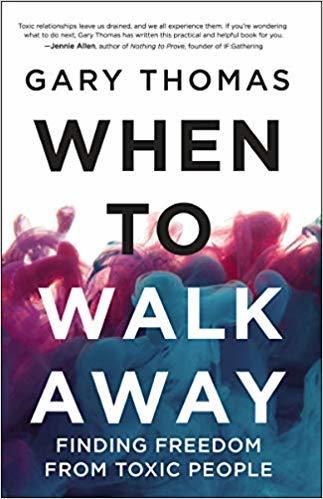Sheila Wray Gregoire's Blog, page 68
December 16, 2019
When Your Husband Doesn’t Protect You from Your Mother-in-Law (or other toxic relatives)
When you have difficult relationships with your in-laws, it’s not up to you to sort it out.
In general, it’s better if the blood relative intervenes on your behalf.
But what do you do if your husband won’t stand up to his mom (or dad)? Or what happens if you have a sister-in-law who is always making cutting remarks, and your husband doesn’t see it?
Christmas is a time when relationships with extended family, and all the drama that can come with that, take center stage.
Last Thursday, on my podcast about toxic family, I was sharing some words of wisdom from Gary Thomas, whose most recent book, When to Walk Away: Finding Freedom from Toxic People, is so helpful for those of us trying to navigate these difficult relationships. One of the examples I shared from Gary was of a husband who told his parents that they couldn’t join them for Christmas this year, because he needed to protect his wife and his marriage. Gary talked about how that can be just the right thing to do if parents are being toxic to their children’s spouses.
But what if your husband won’t intervene with his mother on your behalf? What if he doesn’t see the problem–or, if he does see it, he’s unwilling to deal with it?
This is what so many women talk to me about–a mother-in-law who interferes, or who is very cutting, and a husband who doesn’t do anything about it. Sometimes husbands just don’t see it, because the mother-in-law treats the son like an angel, but then says absolutely terrible things to the daughter-in-law whenever she’s alone. The husband misses all the bad stuff, and can think that the wife is exaggerating. Alternatively, the husband just doesn’t see it because he emotionally can’t–he’s being treated horribly, too, but he can’t deal with admitting this to himself.
I wrote a long post a while ago which is quite comprehensive about this: What to do about a mother-in-law who interferes. I recommend you read that one! But I want to mention a few things today.
In as much as it depends on you, try to love your mother-in-law.
Your mother-in-law does not have to be as wonderful to you as your mom (if you have a great mom). It’s okay if your relationship with her is more based on the fact that you’re related, and that’s about it. You don’t need to be best friends. She doesn’t need to be your confidante. But she is your children’s grandmother (if you have kids), and she is your husband’s mother. She’s going to be in your life for a long time. Rather than getting into a power struggle, it can be so beneficial to just try to pursue a relationship with no expectations.
As James wrote, “My dear brothers and sisters, take note of this: Everyone should be quick to listen, slow to speak and slow to become angry,” (James 1:19). And Paul said something similar: “If it is possible, as far as it depends on you, live at peace with everyone.” (Romans 12:18). It is possible to just not get angry at people if we remain emotionally aloof, and look at their interests rather than your own. That does not mean that we should tolerate abusive behaviour (and I’ll say more about removing yourself from abusive situations), but sometimes we do get worked up when it isn’t always necessary. This is your husband’s mom, even if she’s not a nice person. Whatever you can do to be generous to her will be appreciated by him.
Then, if you stop expecting you and she should have a close relationship, then when she says something ridiculous you can see it more in that way–as ridiculous–rather than as hurtful (I’m not saying she’s not being hurtful; I’m just saying that if you distance yourself emotionally, you can be more like a casual observer of the situation than a participant, and you can react accordingly.
So if she says to you something like:
“I can’t believe how fat you’re getting. You should take better care of yourself. You look horrible.”
You could try:
“Thanks for the feedback. I love how your turkey turned out! It’s so lovely and brown.”
That should leave her cold, because she was trying to get a rise out of you. If you just acknowledge it, and then change the topic by giving her a compliment, that would likely throw her off.
Or you could be more direct,
“That’s a very rude thing you’ve said. I sure hope you don’t speak like that to others, because they may not take it as well as me.”
And then leave the room. Don’t get emotionally invested; just leave the room.
If you don’t think you can do either of those two things, then remain glued to your husband all night so that she doesn’t have an opportunity to say anything biting. But when you resist the urge to get offended, sometimes you bring a peace to the relationship all on your own. If you do find yourself with your mother-in-law, ask her questions about something you know she loves to talk about. Compliment her. Show genuine concern about some things. She may find that she enjoys talking to you!
Repeat what she has said
Another tactic that works well for bullies is to repeat what they have said. So if your mother-in-law makes a comment about Joe, her nephew who is unemployed, and then launches into a diatribe about welfare recipients and how they’re all deadbeats and taking everyone’s money, you can pipe up and say,
“Mom, are you saying that Joe is a deadbeat who is taking everyone’s money?”
Usually, at this point, people retreat a little bit. I’ve seen my son-in-law David use this tactic in many conversations, and my mom uses it all the time, and it does tend to floor people!
After giving a lot of guidelines in my previous post about interfering mother-in-laws, I ended with this:

From What To Do if Your Mother-in-Law Interferes:
What if Your Husband Never Chooses to Leave and Cleave?
What if you’ve done all of this and your husband is still at her beck and call?
Can you move away? I’ve known several marriages that have broken up that I’ve always felt would have survived if they had just moved away from her parents (in those cases it was SHE who wasn’t leaving, not HE).
If that’s not possible, you have two choices:
Grow bitter about it and make his life miserable
Decide to let it go and love your husband
I know that everyone would be better off if your husband learned to leave and cleave. But you can’t make him. You can seek out a mentor couple; you can ask for all of you to sit down with a counselor; you can even go to your pastor. But if things don’t change, what are you going to do?
I wrote a post a while ago about changing our attitudes when there’s one big area where your husband disappoints you–and you have to learn to accept it, and find ways to make your own life happy and peaceful anyway.
If you know that your husband is going to talk to his mom every night at 7 for an hour, then can you find something you do at 7 that you enjoy, so you’re not disappointed and stewing every evening? If you know that your mother-in-law is going to want your husband to help her with errands this Saturday, can you plan something fun for you and the kids so that you don’t end up making him feel guilty?
And if your mother-in-law wants you all to come do something with her, it’s quite okay on occasion to say, “I really need a weekend just with the kids. I’d love for you to join us, but if you feel you must go with your mother, feel free. But I think I’ll keep the kids here with me this weekend.” You don’t need to go along with everything; you can set boundaries yourself.
I think that’s a good perspective, so that’s my final point:
Remove yourself from difficult situations
If the conversation gets too difficult, it’s okay to leave the room. In fact, bring a book so that you can go somewhere else and just read, or bring some toys and then you can retreat into a room with the children until it’s time to go home. Make it clear to your husband beforehand that if his mother (or father, or whomever) crosses a line with you, you will have to remove yourself from that situation.
Sometimes a situation is so toxic that you just feel as if you can’t emotionally handle seeing her at all. And in that case, you can say to your husband:
You are welcome to do whatever you would like for Christmas, but I know that I can’t handle seeing your mother right now, so I will stay home. I would like it if you stayed home with me, but if you feel as if you can’t, then you can go alone this year.
You can’t draw boundaries for your husband, but you can draw them for yourself, if necessary. Again, though, I’d see this as a last resort, and only when the other things don’t work, or when you’re just too emotionally tired to deal with the games right now.
If you do need to take this step, and if he’s upset at you enough and he goes anyway, I would suggest seeing a licensed marriage counselor to talk through some of these issues, because they do matter.
Some other Christmas family posts that may help:
Do I Have to See My in-Laws at Christmas?
10 Ways to Handle Difficult Family Dinners
How to Deal with Toxic Family at Christmas
Have you ever been in this situation with your husband? How did you handle it? Let’s talk in the comments!
Like this post? You should check these posts next!

22 Sexy Stocking Stuffers for you Husband

34 Out of the Box Stocking Stuffers for your Husband
December 13, 2019
10 Ways to Bless Others (and Your Marriage!) This Christmas
It’s God coming down in human form to bring the kingdom of heaven near, and to show us who God is and what He is like.
Yes, it is also about the Saviour coming into the world, but I prefer to think of Jesus’ sacrifice and the cross and resurrection at Easter. At Christmas, I like to think about God becoming flesh and dwelling among us, so that we could meet Him, see Him, feel Him, know Him.
Christmas tells us that we are not alone; that God is here. That God wants relationship, and that He yearns to know us.
And so Christmas should be a time when we, too, think about showing others who God is and what He is like.
It should be a time where we become the hands and feet of Jesus, to play our very small role in “Emmanuel, God with us.”
That’s why I’d like to invite all of you, along with me (and I issue this challenge to me as well) to think about how we can bless others this Christmas. And in so doing, I think we’ll bless ourselves, and our marriages, too! Let’s not make Christmas only about getting together with our own families, and cocooning in our own safe worlds (although I encourage you to listen to yesterday’s podcast if your family isn’t so safe!), and let’s make it instead about thinking beyond our walls and into the world.
God announced Jesus’ coming to those far and wide, not just to those close to Mary and Joseph. The shepherds heard it in the fields. The wise men heard it in lands far, far away. And I hope we can share it with those outside our walls, too. And besides–the more we do things for others, the happier we often become ourselves. Volunteering is one of the best things you can do for your marriage.
1. Bring some yummy stuff to those who are serving your community this Christmas Eve/Christmas
Are you going out to a Christmas Eve service? Or maybe you’ll be driving to your parents’ house on Christmas Day? What about stopping by the fire house, the emergency room, the neonatal ward, the police station, or other places where someone has to be on duty and dropping off some Christmas baking, some donuts, and some thank you cards?
They’re missing out on being with family because they’re doing jobs that all of us need them to do. So say thank you to them for being on duty!
2. Bless some caregivers who are sitting in vigil by someone’s bed this Christmas
On wards at your local hospitals, loved ones are sitting around the beds of those who are ill, missing Christmas at home, but wanting to be with those they love.
Some of the saddest places on Christmas Eve are in the palliative care wards or the children’s hospitals on Christmas. I know that when my husband worked in the hospital, they always tried to discharge as many kids as they could to get them home for Christmas, if at all possible. So often the patients in the hospital over Christmas are very sick, which means their loved ones are very stressed.
And many patients, of course, are also all alone.
Hospitals often have rules about who can visit, and some hospitals may not allow you to visit patients without a background check. But you can often bring care packages for those who are sitting with loved ones. So bring in some Christmas baking; some chapstick (hospitals are notoriously dry); some hand cream; some puzzle books; and maybe even some cards just saying that you are thinking of them and praying for them. Choose a ward, phone the nursing administrator before you just show up, but come on up. You may have to leave the packages at the nurses’ station (they may not allow you to hand them out), but it’s still sweet to do.
3. Go carolling at a hospice, or bring presents for the caregivers
Hospices are a little different from hospitals, and often a little more informal. Phone up your local hospice and ask if there’s anything you can do around the Christmas season. Some may appreciate some carolling (of quiet songs), and some may appreciate the care packages for caregivers as well. Ask questions, and figure out when’s the best time to come.
4. Visit a Nursing Home or Assisted Living Home
Did you know that between 50-60% of nursing home residents never get any visitors? I found this little anecdote on an article about senior isolation in Atlanta:
Laurie, is one of the forgotten. Not long ago, on Christmas day, a group of volunteers from Second Wind Dreams, an Atlanta-based nonprofit, was delivering gifts to some of the elderly in her nursing home. One of the children in the volunteer group noticed that Laurie was walking up and down the hall attired in an evening gown.
She was so dressed up, in fact, that the girl thought she must be on her way to a black-tie event and remarked to Laurie how beautiful she looked. Laurie simply said: “You know hon, I heard I was going to get a visitor today, so I wanted to look nice.” It turned out that Laurie was one of the people the volunteers had on their list to visit.
Call a nursing home near you and see if you can come in and bring some Christmas cheer. Go as close to Christmas as you can, so that it’s extra special for those who won’t get visitors. Wear you most terrible Christmas sweaters! Read the Christmas story out loud (and if you have children, have them read it–but practice first so they can do it well, and teach them how to read LOUDLY). Bring some lovely Christmas decorations and hand them out to people to put in their rooms. (It’s best not to bring food, since many residents are on strict diets). Throw in some lovely hand creams.
Then just visit. Sit and do puzzles with some residents. Go around the room, shake people’s hands, and ask them to tell you about their favourite Christmas, and what made it so special. Here’s another way to bless people: see if you can bring pets. Rebecca and Connor (my daughter and son-in-law) have a little yorkshire terrier. They’ve left him with a dog sitter a few times, and this sitter asks permission to take little Winston to see her father in a nursing home. He used to have small dogs, but now he doesn’t. And Winston jumps right up on his lap and makes him so happy.
If you’re going to visit a nursing home, please phone first and ask how you can help and when would be the best time.
5. Include International Students in your celebrations
Do you live in a town with a college or university? Chances are there are international students staying there over Christmas with nowhere to go.
My friend Mollie has returned to school at the age of 50 to retrain, and she’s met a number of women from India. She decided to throw a Christmas party for them, with all the trimmings–turkey, stuffing, mashed potatoes, everything. And she’s asking people to donate things so that each woman gets a stocking. She asked them all, and out of the 15 people, only one had ever been inside a Canadian home.
Many colleges and universities have Christian ministries on campus. Contact the ministry and ask if you can help with a Christmas dinner for international students–or, if you know some students yourself, invite them to dinner!
6. Invite 2 extra people to Christmas dinner
Speaking of dinner, if you’ve got some extra space around your Christmas table, what about inviting some people who don’t have family in the area, or who may be alone for Christmas? Think of the single people in your church, or the young couple who has moved across the country. Or what about some of your neighbours who may be alone?
7. Make care packages for the homeless and deliver them
Many of us spend November filling shoeboxes for those on the other side of the world. How about making care packages for those who are closer to home? Put them in one of those reusable fabric bags, and include warm wool socks, underwear, scarves, hats, some granola bars or high fibre protein bars, some gum. Even include something to help fight boredom, like a puzzle book and some pens. Many of the homeless women in my town actually crochet dishcloths and try to sell them on the street, so I’ll be including some yarn and some crochet hooks.
And you can also call up some of your local soup kitchens, too, and see if they have volunteer spots available. It’s also a great volunteer opportunity to do as a family.
8. Buy a Christmas tree and decorate it for a family in need
A church I once went to hosted neighbourhood Christmas banquets for the community, where the aim was to bless the neighbours. And part of it was always a raffle of Christmas trees. We’d buy trees, decorate them, and then raffle them off. Then we’d deliver them the next day. It was always amazing how many homes where we delivered them didn’t have a tree, and they’d be over the moon with delight.
If you know a struggling family, maybe a woman who has recently left an abusive marriage and is picking up the pieces with her kids; a refugee family that’s recently arrived; a family that just doesn’t have a lot of money this year, see if you can bring them some Christmas cheer, too!
9. Shovel neighbours’ driveways
If you’re in Canada like me, or in the northern states where you get snow at Christmas, pick up some shovels and go shovel out some of your elderly neighbours’ driveways, or the driveways of single parent families or other young families who are run off their feet. I know there were times my husband was on call for 36 hours straight in the middle of a snowstorm (or he stayed at the hospital so he wouldn’t have to battle snow if he got called in the middle of the night) and neighbours helped me with my driveway. Get a few big thermoses of hot chocolate, bring some Christmas baking, and drop off a few cookies while you shovel!
10. Use the conversation starters for richer conversations
Finally, around your own dinner table this Christmas, don’t forget to use our conversation starters for meaningful conversation! Let’s build some real connection in our families this Christmas.
Here’s what I suggest: Pick an evening close to Christmas when you can do one of these things, and then talk to your spouse about choosing one to do! Let’s make a difference together.
Have you ever volunteered somewhere over the Christmas season? What did you do? Let me know in the comments!
December 12, 2019
Podcast Extras: How to Handle Toxic Family Members at Christmas
What do you do when your extended family is just plain crazy?
Or at least you FEEL like they’re crazy? Today on the podcast I’m talking about how to handle toxic family members at Christmas. Listen in to the podcast here:
Browse all the Different Podcasts
See the Last “Start Your Engines” (Men’s) Podcast
How do you know if a family member is toxic?
I tend to define toxic people in one of two ways:
They’re abusive and bullying, trying to make themselves feel superior by making you feel inferior, through belittling, insults, or constant criticism
They manipulate and try to control what you do, and do not accept or tolerate disagreement
If you read the book Boundaries (which I highly recommend), it explains how our thoughts, attitudes, and choices are all within our realm of control. So think about your life as a series of fields, with the things that you are responsible for in your yard, all fenced off. Now, if your mom tries to break through that fence and tell you what to do or manipulate you, she’s violating your boundaries. And similarly, if you think that you’re responsible for other people’s feelings, then you’re living a boundary-less life. It’s a great concept to understand.
So what do you do if your family members do this all the time?
Well, I had three different scenarios that I looked at on this podcast:
What to do when family members refuse to see you in an attempt to punish you for something
What to do when you wonder if you should walk away from family members
What to do when you don’t like what some family members are doing–but they’re not actually toxic? Living a lifestyle you disagree with, or doing things you disagree with, does not mean that the person is toxic, after all.
I covered the first two, and then Rebecca and Connor chimed in with another scenario, because I’m getting over a cold and my voice wouldn’t allow me to do the whole thing! But that last one is really important to understand–not everything that we don’t like is toxic.
The big point that I made in this podcast was this:
In unhealthy families, loyalty matters more than truth.
So if you’re trying to walk in truth, you’re going to seriously upset toxic family members. I don’t have time to write a full synopsis of the podcast, but these two articles sum up the first two points:
What Do I Do If I’m Estranged from Family at Christmas?
How to understand why family members may cut you off, and why people may side with them, even if they love you.
Save Yourself from Toxic Family Members this Christmas (Gary Thomas)
Gary Thomas has just written a great book about dealing with toxic people, and here’s some of his thinking where it has to do with Christmas. But I really recommend that you look at:
When to Walk Away: Finding Freedom from Toxic People
Here’s Gary’s new book–what to do when you have toxic people at work; in friend groups; at church; in your extended family–even if you’re married to toxic people or your child or parent has become toxic. It’s a really great book that shows you how Jesus walked away from toxic people, and allowed toxic people to walk away from Him without giving chase. Sometimes being like Jesus means walking away. If you’re having trouble this Christmas, this is a great read.
I also mentioned these things in the podcast:
It’s Not Your Job to Make Your Husband (or Others) Happy
A recent post about boundaries–it’s great to love people, but you are not responsible for how they feel.
My Soul Ties Series: What to do if you have unhealthy emotional bonds with kids (or parents)
Extended families are tricky! And here’s a post about how to make sure that you aren’t forming weird bonds with your kids, like the one in the scenario that I used in the podcast.
No, Having More Sex will Not Stop Your Husband’s Porn Habit
Last week’s podcast! If you haven’t listened, you should. It’s a really important concept, and I am determined to break this misperception.
And Rebecca mentioned these things:
I was talking in the podcast about some of the signs of healthy families, and I referred to some of the research in my daughter Rebecca’s book. If you haven’t checked it out, please do! It’s a great read, filled with stories of millennials and generation Z kids who grew up, some who rebelled, and some who didn’t. And she looks at the protective factors in families that tends to keep kids from rebelling. One of the main ones? In healthy families, kids are allowed to tell the truth, even about doubts about their faith.
10 Conversation Starters to Have More Meaningful Conversations Around Christmas Dinner Table
Great ideas to get your extended family talking about important stuff!
Finally, if you’re not signed up yet for my email list, I mentioned a few times in the podcast some things that went out in emails lately that weren’t on the blog. So sign up!
So what do you think? Have you had to navigate toxic family members at Christmas? Or family members that you just find difficult? Let’s talk in the comments!
December 11, 2019
16 Couple Gifts to Buy For Yourselves this Christmas
Are you the kind of couple who buys each other Christmas gifts–or who goes in together and buys one big couple gift?
Keith and I have a real problem every year with gifts, because our anniversary is also December 21. So every year, just when we’re trying to figure out gifts for everybody else, we also have to figure out TWO gifts for each other. And since both Keith and I have very specialized hobbies (I’m a big knitter; he’s a big bird watcher and miniature soldier painter), it’s hard for us to buy for each other. We both want such specific things the other isn’t knowledgeable about.
It’s always a little bit stressful, and as a person who does NOT have gifts as her love language (and neither does my husband!), we often wonder if it’s worth all of the worry.
Besides that, we totally share bank accounts, so if he “buys” me a present, it’s not really like he’s giving me something, since it was my money already. It’s more like he’s spending our money, in a way to say, “I want to bless you with this without having to worry about spending money on yourself.” That’s lovely, but again–it’s not always what I want.
That’s where couple gifts can come in handy.
Some years, to avoid the hassle of having to find two presents for each other, we just decide that we will find something we both really want and buy it to bless our marriage. In fact, often this gives us something we want more! If he buys me something he thinks I’ll like, he doesn’t always get it 100% right, and vice versa. Plus, he only has 50% of the money to spend as he would have if we went in together. So often a couple gift gets you more of what you want–you just lose out on the surprise factor Christmas morning.
After all, if you combine forces, you have twice as much money to spend! And that can get you something awesome.
So today I thought I’d talk about couple presents that can bless you together. I don’t just want to look at buying stuff you both really want (like a new couch or a super cool espresso maker or a new appliance, even if those may be wonderful), but instead buying a couple gift that will actually bless your marriage. So let’s look!
This post contains affiliate links.
Try the “Gift of an Experience” Couple Gift
One of the best couple gifts I can think of is an experience where you go and do something together and build memories, have some fun, and laugh together!
Here are a few ideas:
1. Plan a trip together
Keith and I just loved our walking tour of Ireland we did a few years ago with Hillwalk Tours. It was a self-guided walking tour, so they made all the arrangements at the B&B and provided the maps, itinerary, and all the instructions we needed, and off we went!

Us on our amazing holiday in Ireland!
Maybe there’s some place you’ve always wanted to visit–or maybe you want to go back to the place you went for your honeymoon! Maybe you never even took a honeymoon. Instead of putting money towards individual gifts, maybe that money would better be put into a fund to save up for a trip that you both would absolutely love.
Can’t afford a big trip? There’s always the option just to take a romantic weekend getaway, just the two of you. That’s cheaper than a trip, and if you need extended time together, it’s a great way. Choose a location a little bit of a drive from where you live, so that it seems at least a little exotic, and choose a great place to stay. Remember–staying for 2 nights during the week is often cheaper than the weekend, so if you all have a flexible work schedule and flexible baby-sitters (if needed), that may be an option, too!
2. Go on a marriage weekend
Just a few weeks ago Keith and I spoke at the FamilyLife Canada Weekend Getaway in Whistler (FamilyLife Canada’s marriage conferences are very different from FamilyLife US). It’s such a fun weekend where you learn great SMALL things you can put into practice right away to enhance your marriage–while you also get a weekend away in a lovely hotel, and a chance for a great extended date night on Saturday night.
Check out some marriage conferences in your area, because every marriage needs a tune up sometimes.
3. Buy tickets to a Concert, Play, or Something Super Cool
My youngest daughter and her husband are buying tickets to the World Figure Skating Championships in Montreal this year. She always swore to herself that if it was ever anywhere near her in Canada, she’d go, and this is the year! But if that’s too expensive, consider tickets to a play, concert, or sporting event you’d both love.
Choose a Couple Gift that Focuses on Couple Fun
I’m a big believer that couples should have hobbies together! The more time we spend just doing things together and having fun, the better our communication will be. When we’re able to just chat and laugh together, then we build the foundation to also address serious stuff in the marriage. And we build great memories and camaraderie, too.
4. Take ballroom dancing lessons
One of the most romantic things Keith and I ever did as a couple was learn to ballroom dance. We’re not awesome, but we’re passable. And that means that when we’re at weddings or on cruises or something where there’s dancing–we can actually dance!
Don’t know where to take lessons? We’ve also discovered how you can take ballroom dancing lessons online (I’ve got a whole post on it here, including video of Keith and me trying!). And if you want to take a Crash Course in Ballroom Dancing (where you learn enough to do 3 dances in just 1.5 hours), try this one! But remember: It’s only a real couples gift if you actually practice. 
December 10, 2019
25 Best Boxer Shorts to Use as Stocking Stuffers for Your Husband
Looking for some funny stocking stuffers for your husband? I found a ton of boxer shirts that fit the bill!
(or fit the package, as the case may be).
I was going to write an updated post on Sexy Stocking Stuffers for your husband, to go along with the post I wrote a few years ago. But as I was looking for sexy things, I kept finding all of these really quite funny boxer shorts. So I thought a better idea may be to run a post with some of the best of them, and then you’ll likely find one here that will make your husband laugh!
Like this post? You should check these posts next!

22 Sexy Stocking Stuffers for you Husband

34 Out of the Box Stocking Stuffers for your Husband
I think these are fun presents because they are actually practical (he can wear them!), but they’re also a little intimate and they’ll put a smile on his face. Oh, and I’ve included some simple ones that are just high quality, too, if you’re dying to throw out any underwear with holes in them!
And this post contains affiliate links.
Let’s Start with a Selection of Funny Christmas Boxer Shorts:

“Just How Good Do I Have to Be?” Funny Boxers!
These are kind of fun. You can have him promising to be a good boy for you at night!
See them on Amazon!

Kiss Me Under the Mistletoe!
Wait–WHERE does he want to be kissed?
He might really appreciate this one!
See them on Amazon!

Feeling Turned On This Christmas?
He is! Or at least he will be when you give him these…
See them on Amazon!

A Whole New Meaning to Santa’s Sack!
What’s he got in his sack?
I’m sure he’d like you to find out!
See them on Amazon!

Ready for some Christmas Fun?
Christmas is a happy time–and maybe one of the things that brings joy to your life is your husband–and these boxers show him why.
December 9, 2019
When What You Do for Gifts at Christmas with Extended Family Has to Change
Or is Christmas itself with your extended family become too big?
This post is going up a little bit late today because I’ve been under the weather for a few days (I’m still just recovering and not feeling the best).
But I had a few thoughts I wanted to share.
With Rebecca and Connor having a baby now, our family has another generation. So Christmas is no longer getting together with the grandparents and the grandkids (and us middle generation); I’m now the grandma. And that may mean that we want to do different Christmas traditions.
A few years ago we also changed the way that we did gift-giving in our extended family. But that can be a big source of stress at Christmas. Do you still buy siblings Christmas presents when you’re adults? What about parents? What about when the siblings get married? Do you then buy the spouse a present, too? Is there a value limit?
We ran into issues with our extended family because some family members would get gifts for everyone, but some wouldn’t. And then a few years ago we changed up everything. And in the process, I wished I had raised the issue ten years earlier, because we were all thinking it, but none of us knew what to do.
In this post, I’d like to just give some different options for how to do gift giving, and then you can take a deep breath, get some courage, and raise it with your extended families, too!

7 different models of Christmas gift-giving for extended families:
The Everyone-Gets-a-Gift
Everybody still buys a gift for everybody. Often this is the default. You grow up as a teenager buying your sister and brother a present, but then you get to be no longer teenagers anymore, but you keep it up. But then you get married. Do you still keep it up? So you do, and just wait to see what your siblings do. They still bought gifts as well. And then this goes on, and on, and on…
The Pros: Everybody feels included. People with gift-giving as their love language feel valued.
The Cons: It gets really expensive, and often a little bit ridiculous. Everybody is buying stuff for each other that we could just buy for ourselves. It can seem a little pointless.

Katie with her cousin Jessica at Christmas
The Everyone-Gets-A-Gift but There’s a Limit
You still buy for everyone, but there’s a limit (say $20 or $40).
The Pros: Sometimes the gifts can be interesting, especially if there’s a lower limit, because you spend all year looking for something really interesting or quirky that’s under $20, and what you buy can still be kind of interesting, because looking for something that’s cheap often means you find some amazing vegetable peeler or some really quirky back massager or something.
The Cons: You’re still shopping for a lot of people, and you’re still spending a relatively lot of money. And do parents only get the cheap gifts? What if parents used to give you great gifts?
The Pick-a-Name
Everyone reaches in a hat at Christmas and picks the person they buy for the following Christmas. There’s a limit (say $50), but you can keep a look out all year. We did this one year, and one sister-in-law bought another sister-in-law a beautiful Christmas ornament with a picture of her dog who had passed away. A sister-in-law bought Becca and Connor a night in the Escape Room in Ottawa. It was actually pretty great.
The Pros: You get a gift that’s tailored towards you.
The Cons: It can be hard to buy a good gift for someone you don’t know very well. Again, what do you do with parents? Do they stop buying gifts?
The Secret Gift Exchange
This one goes by several different names, but everyone brings a gift, wrapped, of a certain value (say between $30 and $50). Then you pick numbers to see who goes first. The first person chooses a gift and opens it. The next person can either steal THAT gift or opens another. If a person gets their gift stolen, they open another gift. And it keeps going. The rules we’ve always used are: You can’t steal the same gift twice in a row; and once a gift has been stolen three times it’s settled and can’t be stolen again.
The Pros: It’s actually a game, so it’s not just everyone sitting around opening stuff. You can buy pretty funny gifts to make it interesting.
The Cons: Often the gifts are still not what you would have spent money on yourself, and you still run into problems with gifts for parents.
The Children-Get-Gifts-but-No-Adults-Do
You restrict gift-giving to just the kids, and once they hit 18 (or they’re done college, your choice) they stop getting presents. This way adults aren’t spending money on each other, buying stuff that you could have bought for yourselves.
This is what we’ve always done on my mother’s side of the family, and it’s worked great. We’ve combined this with charity giving as well, and it’s just more in line with what we’re like, plus none of us is particularly gift-giving.
The Pros: It’s a lot cheaper, and the ones who honestly don’t have money and who actually appreciate gifts still do get them.
The Cons: The adults with gift-giving as a love language are hung out to dry. And, again, what do you do with parents?

Rebecca and Connor on Christmas morning
The Pool-Your-Money-And-Have-an-Event
Another idea is to take the money that you would have spent on Christmas gifts for each other, and pool that money so that you can all do something together as a family and make some memories. Maybe you go out to eat for Christmas at a restaurant if no house will hold you (this also makes it easier to escape if you don’t want to stay all day). Maybe you all go bowling or go skiing, depending on your budget.
This is what the “cousins” in our family have decided to do, rather than presents for each other. My kids’ generation are all very close in age. The five of them are within 3 1/2 years of each other. And now that they’re adults, many have significant others (or spouses). They’re all also short on money because they’re young and they’re all trying to either pay off student debt, get through school without debt, or save for something big. But they’re also quite good friends who don’t see each other very often, and they want to get together outside of just the big family event.
So for the last few years they get together to have a big board game tournament at Christmas, and they take the money they would have spent on presents and instead buy snacks and hors d’oeuvres. It’s actually a lot of fun!

Board games with the cousins in 2016!
The Pros: You actually spend time together and get to talk and make memories.
The Cons: It can be hard to find one activity that everyone in the family would want to do.
The Pool-Your-Money-And-Give-to-Charity
If your family is big on giving to charity, you can all get together, throw money into a hat, figure out how much you have altogether, and then look through those charity “gift catalogues” where you can buy 3 billy goats for a family in India or a well for a family in Liberia or soccer uniforms for a team in Kenya and you can all together choose that. Partners International, World Vision, and many other charities put out such catalogues.
The Pros: Your money goes to something important, and you can feel good about that.
The Cons: If it’s not clear how much you should contribute, some may not contribute much and then feel judged; or if you put an amount everyone should put in, some may feel pressured. Also, then no one gets a gift.
Thoughts when deciding which gift-giving method to choose for extended family
The hard part comes when some people in your family really love gift giving and have gift giving as your love language. I don’t; they’re like negative on the scale to me. But when people really enjoy it, to take away gift-giving can be jarring for them. Also, not wanting to buy gifts for siblings/cousins and in-laws is one thing; but parents can be different, because parents often still want to buy for kids, and still appreciate presents.
In my experience, the younger generation seems much less wedded to gift giving than the older ones, and the younger ones are often eager to dispense with it (though perhaps that’s just my experience). But there does come a time when buying gifts for so many people that you don’t know well at Christmas becomes too expensive and too stressful, and makes it hard to enjoy the season with your own nuclear family. So sometimes you do have to figure out something new to do.
What about the bigger picture of family get-togethers?
This is what we’re also struggling with right now. When we started having the Gregoires all get together for Christmas, for instance, when I first married Keith, there were 7 of us (Keith’s parents, three brothers, and me). Then one by one everyone paired off, adding 3 more. Then the kids came, adding 5 more. Then the kids paired off, so that our numbers are now at 21 if everyone is there. That’s a much bigger production. You can’t all sit at one table. It’s hard to fit everyone in one house!
Not just that, but now with grandkids having significant others, that’s a lot of OTHER family’s schedules that have to be worked around. In our family group, it used to be that the kids would have Gregoire dinner and Wray dinner, plus our nuclear family dinner. But now, for Katie, for instance, there’s Gregoire dinner and Wray dinner and Emerson dinner and then our nuclear family dinner. That’s 4 dinners. (Granted, our nuclear family one is usually leftovers while in pyjamas all day and playing board games, but I’m totally wedded to that. That’s the most important part of Christmas for me!). And at least Katie doesn’t have any divorces in her family. Add some divorces, and then you’d multiply everything by two.

Playing board games on Christmas!
It’s fine right now, but I can see how, in the future, as more little babies are born, something’s going to have to give. What I’m thinking is that we’ll have a Gregoire get-together in the summer, and at Christmas, Keith and I will still get together with his parents, but the next generation may not even come home. We may go to them.
So those are all my thoughts and ideas. And now I’d love to know: Has this become a big problem in your extended family? How do you navigate gifts? What about getting together at Christmas? Let’s talk in the comments!
December 6, 2019
Can We Revisit Masturbation in Marriage?
I’ve talked a lot about masturbation in marriage on this blog before.
I’ve tended to come down pretty hard on masturbation (I really hope there’s not some ugly double entendre there that I’m not seeing) in the past when it’s done for selfish reasons.
In this post, for instance, I went over two scenarios for masturbation:
Masturbation and porn use which steals sexual energy from your spouse
Turning to masturbation instead of dealing with key issues in your marriage.
I think (hope?) we’d all agree that number one is wrong. You should not be masturbating, especially not to porn, instead of having sex with your spouse, and yet I have letters everyday from women especially whose husbands choose porn and masturbation over them. Not okay.
But what about the second one? Here’s what I said in a previous post on masturbation in marriage:
God gave us our sex drives so that we would be drawn to each other. That uncomfortable feeling of not having intimacy is so bad that it forces us to work on our issues and to improve the relationship…
I have known so many couples where sex starts to become nonexistent because they prefer masturbation to intercourse. When you masturbate, it feels more intense immediately, because you give yourself feedback on what feels good. And you can bring yourself to orgasm without all that hassle of having to make someone else feel good, too! Plus, some spouses are not that skilled at making you feel good, so masturbation can seem preferable.
Even if it doesn’t start off that way, it can become that.
Second, it does change the dynamic of sex. There’s something about unfulfilled sexual desire that makes you long for each other even more. When you want someone but you can’t have them, but you can text them and tell them what you’re feeling, or you can plan out elaborately what you’re going to do to them that night–well, that can heighten passion. If you deal with all of that tension yourself, you really do miss out on something together.
And finally, self-control is not a bad thing. To have to channel sexual energy into something else for a time when you can’t get fulfillment teaches you a lot about yourself, about God, and about growing your character. Is it really so bad to have to wait?
What I also said in that post, though, is that touching yourself during sex or as part of foreplay is not masturbation. There is nothing evil, per se, about putting your hands on your genitals. And the problem with masturbation comes in two ways:
When it’s done secretly and shamefully, creating distance between you, in lieu of working on an issue
When it steals sexual energy from your spouse
But are there cases when masturbation in marriage could actually be a kind and helpful thing to do?
That’s the question that I was confronted with late last month when Keith and I were speaking at the FamilyLife Canada conference in Whistler, British Columbia. Here’s the scenario: A woman has tremendous pain during sex (vaginismus), which she is getting treatment for. She is discouraged and depressed and feeling like a failure. The husband feels a build-up of sexual frustration, but the last thing he wants is to burden his wife with this. He wants to love her and let her feel unconditionally cared for as she goes on her treatment. Is masturbation in this case wrong?
He’s doing it not to steal the sexual side of their relationship, but rather to protect her and help her feel loved and accepted while she’s going through a time when she can’t have sex (and apparently the couple was connecting in other ways sexually, but this, too, was sometimes difficult for her because she still felt like a failure. So she was getting orgasms at times, but found the pressure to perform sexually to be daunting).
Do you yearn to have a more meaningful–and fun–sex life?

Check out my 31 Day challenge that you do with your spouse. Super easy–just read a few pages a night and do what it says. Learn to talk more, flirt more, be more affectionate, spice things up, deal with baggage, and so much more!
No blaming. Just solutions–and a whole lot of fun!
Let's try it!
I’ve had other questions from people in similar situations:
Couples where there is a prolonged post-partum healing time because of a difficult birth, while there is also exhaustion from the newborn days
Couples where there is a chronic pain condition or injury
Couples separated from each other for prolonged periods of time (weeks or months at a time) due to work, military deployments, or immigration problems.
Is there a role that masturbation can play in these situations?
Don’t use masturbation as a short-cut to avoid doing real work in the relationship.
(Click here to tweet this quote)
At the same time,
Anything we do in marriage should enhance intimacy, not detract from it.
The goal of marriage is oneness–“the two shall become one flesh”. That doesn’t just mean sexual oneness, but spiritual oneness–feeling as if you truly are one. If masturbation is being used to allow you to be more giving in the relationship, that’s one thing. But if, in the example of the woman with vaginismus, for instance, he’s using masturbation to relieve sexual frustration but he’s also not initiating any intimacy with her (including just being naked together and taking baths together, or touching her, or even bringing her pleasure), then that’s a problem.
Similarly, if someone has a chronic illness and just doesn’t feel sexual for a time, they still need to feel close to you. If masturbation is used as a way to relieve frustration so that you then can ignore your spouse, then that’s selfishness, not selflessness.
Be careful about justifying the use of masturbation.
Please don’t take what I’m saying to mean, “If I’m sexually frustrated, it’s a gift to my spouse for me to masturbate!” That’s not what I’m saying at all. I’m saying “if you’re sexually frustrated because it’s impossible for you to make love for an extended period of time, it could be a gift to my spouse for me to masturbate.”
I’m not talking about some Tuesday where she turns you down. I mean when there’s an extended period of time.
This is why I hesitate to write posts like this, and often come down really hard on practices like using some sex toys, or watching nudity on TV. If you give exceptions, it can easily open a Pandora’s box. So be honest before your spouse, before God, and before yourself. No excuses. What is really your motivation? I guess in this post I’m moderating a bit what I’ve said previously, but I really don’t want anyone to take this to mean that it’s all a-okay.
Don’t use masturbation as a short-cut to avoid doing real work in the relationship.
If your spouse is consistently rejecting sex and has a really low libido, the answer is usually not masturbation as much as it is working on the relationship, figuring out why she says no to sex, or why she doesn’t want to have sex, trying to rebuild your friendship, or even going for counseling. If you’ve been living in a sexless marriage, I feel for you, and I can see where masturbation may seem necessary. But I would say that if you’re going to do that, you should at least also be trying to get to the root of the sexless marriage, and insisting on some marriage counseling.
And I’d strongly urge you to work on your emotional connection, so that you can talk about this stuff more. I’ve got a great FREE 5-week email course you can sign up for to help you build oneness.
My last word: If you’re masturbating because you’re simply away from each other–let the other in on it!
What if she’s away for work for three weeks, or he’s temporarily stationed away from home? And you’re both getting sexually frustrated? My quick answer would be to at least let each other in on it. That’s a lot more fun. I’m going to try really hard not to be too graphic here, but chances are you each have phones and can talk to one another. (Please beware of Skype/FaceTime on public wifis from hotels! Just be smart. It’s really easy to hack those signals. Get a VPN to make emails and other apps secure when you’re traveling).
Like this post so far? You should also check out:

Pastors: Enough with the “Boys Will Be Boys”

Men Are Visual: Does That Mean All Men Lust?

Why Every Man’s Battle Backfires

Can We Talk About Men’s Sexual Needs in a Healthy Way?
Okay, now I’d love to know what you think.
I understand that many commenters will say that masturbation is wrong regardless, but can we agree that before we make pronouncements like that, we do two things:
Make a strong biblical argument, don’t just say something as if it’s true without showing why it’s true
Take into account the husband in the first scenario who honestly is trying to love his wife.
Thanks! Now have at it! (that’s not a bad double entendre, too, is it?)
UPDATE: My real motivation for the post was this: I’ve written before some posts that come down pretty hard on masturbation, and then I’ve heard back from people who have read it who now feel so guilty and so sinful, when their motivation does seem loving. They want to be patient and affectionate and available to their spouse, but frustration builds and they’re getting irritable. And I’m just not willing to label all of these things sinful. I don’t think that’s helpful and I think it adds a layer of shame that doesn’t need to be there. There’s just so many issues and permutations that marriages go through, and I don’t want to add to legalism. So this is my attempt to try to find some nuance!
And what I should have said more explicitly is that, if a person has a history of porn use, then masturbation is not a good idea. It’s too caught up in porn and lust, and could suck someone in to that again.
December 5, 2019
The Porn Habits Podcast: How Porn Affects Marriage
How does porn use before marriage affect marriage afterwards?
I wrote a big post on how porn hurts your sex life earlier this week, and I felt like it was such an important subject (and we got so many comments) that I thought it was important to expand on it a bit and use it as the topic for this week’s To Love, Honor and Vacuum podcast.
But first, here’s the podcast.
Browse all the Different Podcasts
See the Last “Start Your Engines” (Men’s) Podcast
We need to stop telling wives that if they just have more sex, their husbands won’t watch porn.
As I explained in my post this week, that completely ignores the fact that, if you’ve been married for 20-25 years or less, chances are a porn habit pre-dated the marriage. That means that it likely changed how the guy copes with stress; how he sees sex; how he gets aroused; how he functions sexually; how he views intimacy; and so much more.
All of this came about because a reader wrote to me very concerned about a Focus on the Family broadcast that aired last week when, at the 16:21 mark, the host said that maybe the reason guys turn to porn is that wives don’t give them sex. I think it’s time to deconstruct that argument.
Here are some extra links that you may find helpful:
The original Focus on the Family broadcast
The original post: How porn use before marriage affects marriage. Be sure to read the comments, too!
Other posts on porn that can help:

How Porn and Anger Go Together

10 Things to Know About How Porn Affects Your Sex Life and Marriage
Posts on What Sex is Supposed to Be Like:
I also talked about understanding the complete picture of how God made sex, and these can help:
The Good Girl’s Guide to Great Sex
The Theology of the Clitoris
The Theology of the Penis
Why We Need a New Definition of Sex
How to Have These Conversations Before Marriage
If you’re engaged and getting married soon, it’s important to talk about porn use before you get married, and to deal with its effects. It’s not enough to just quit porn; we also have to be open about how porn has reshaped our sex drive and expectations, and we have to be open to learning from scratch, from the beginning.
My honeymoon course is a great resource for that, with videos and discussion questions to help guide that discussion in a safe way before marriage–while also making sure that the discussion DOES happen. It matters. Plus it helps couples get ready for sex once they’re married, so that it can be a truly intimate experience from the get-go! Take a look at it here.
Are you ready for the honeymoon you always dreamed of?

The Honeymoon Course is here to help you plan the perfect honeymoon and start your marriage (and your sex life!) off with laughter, joy and fun!
Don’t make the same mistakes other couples have–get it right from the beginning!
Learn more
Finally, a personal note.
This has been a hard week for me as I’ve processed all this. As I shared in the podcast, back in 2005 or 2006, if you had asked me, “will having sex a lot stop a man from watching porn?”, I would have likely agreed. Why would a guy go for an imitation if he could have the real thing with his wife?
But that’s largely a generational view. I got married before the epidemic of internet porn hit. And the world I grew up in is a very different world.
As I started getting email after email of wives married to men with no sex drives; with horrible sexual dysfunction; who demanded selfish things in bed; who were angry if wives didn’t like being used; I started to realize that something was very, very wrong. And so I read a ton, and learned a lot, and changed my views.
Unfortunately, that hasn’t seemed to have happened in the larger Christian world, and so many women are still getting this message–his porn use is your fault.
This pains me. It’s hurting so many women, and frankly, I just want that to matter. I don’t know why it doesn’t seem to. I don’t know why we’re so quick to blame women for this.
And here’s another thought: If we talked more about the effects of porn on your sex life, don’t you think it would be easier to help young men fight porn use? Instead, we tend to just talk about it as a sin (which it is as well). But if we gave guys the whole picture, I’d think it would be empowering.
Also, by blaming it on women not having sex, then we’re framing marriage as something that can cure a porn addiction! And that’s not true. But it makes men feel as if they don’t need to confess it before marriage; they don’t need to be free of it; it’s the wife’s job to get him over it. That’s not how it works.
Incidentally, women are watching porn in greater numbers as well, and I’d like to do a podcast soon on that, too. But for today, just know that I’m sad, and I’m hoping that by speaking out, we can make a difference and help people to see that this issue is not the same as it was 30 years ago. And we need to get real about it.
Pass the podcast along if you appreciated it! I think it’s one that may help a lot of people.
I know we’ve already discussed the main part of this podcast already this week, but here’s another question I’ll throw out: Why do you think Christian organizations haven’t caught up to the secular world when it comes to understanding the dynamics of porn on relationships? What can we do to help and speed up this process?
December 4, 2019
You Don’t Have to Make Your Husband Happy, Your Kids Happy, or Your Family Happy this Christmas
Are you responsible for making your husband happy–or for making your wife happy?
What about your kids? Do you owe them a happy life? Do you owe your parents a happy Christmas?
I gave a speech at my daughter’s Katie wedding where I was trying to express a big truth, and I still don’t feel like I did a good job (the speech was short; but that’s not really an excuse. Lincoln gave the Gettysburg address in just a few minutes; i could have figured it out better).
(Incidentally, if you want to hear another part of my speech, and Keith’s speech, and Rebecca’s speech, watch Katie’s wedding video!).
Anyway, what I was trying to say was something like this:
Many people will give you advice about how to have a good marriage, how to be a good wife, how to make your husband happy. But what those people think doesn’t matter. What your husband thinks isn’t even the main goal. It’s what God thinks that matters. When you run after God and let Him become bigger in your life, you’ll love David well and have a great marriage. But when you’re focused on what other people think you should do, or how other people feel, you can miss the boat. Pursue God; and everything else falls into place as it should.
It didn’t come out well, though, and I’d like to elaborate on it today, because in the Focus on the Family broadcast I shared yesterday, that was actually the focus: how a wife can make a husband happy. And this time of year, we’re often focused on how to make our kids happy, or how to keep peace in the extended family.
That’s simply the wrong focus. So let’s start from first principles:
God does not tell us we are responsible for making other people happy.
We are not responsible for other people’s feelings. We are only responsible for our own attitudes and actions.
God never tells us to make others happy. He tells us to be kind, loving, peaceable, giving, good, trustworthy, faithful. He tells us to treat others as we would have them treat us; He tells us to act as someone’s neighbor (easier said than done in marriage–that’s why “my husband is my neighbor” is thought #1 in 9 Thoughts that Can Change Your Marriage!).
But then there’s something deeper (as C.S. Lewis would say, there’s a deeper magic! Higher up and further in!).
The goal is not just to be kind, loving, peaceable, giving, good, trustworthy, his neighbor, etc. etc. The goal is to grow to be transformed into the likeness of Christ (Romans 8:29), that we may show people God, and point others to Him.
In the same way, let your light shine before others, so that they may see your good works and give glory to your Father in heaven.
Matthew 5:16 (NRSV)
The goal is to point others to Jesus.
Those are the goals of your life: To be transformed into His likeness, and to point others to Him.
Your ultimate purpose, then, is not that your husband is happy, or that your kids are happy and have an easy life, or that your mom is happy with you. Your goal should be that God is glorified.
To me, that’s a big relief. I’m not responsible for my kids being happy or for Keith being happy. I’m just responsible for acting as Jesus would, and for growing in my relationship with Him. And that’s something I can control!
Paul even wrote:
If it is possible, as far as it depends on you, live at peace with everyone.
Romans 12:18
Paul knew that sometimes whether or not someone is happy with us actually does NOT depend on us. We are not ultimately responsible.
That’s really what I was trying to say to Katie: When we serve God and run after Him, then we’ll end up treating our spouse well, and the marriage will usually grow.
When our aim, though, is our spouse’s happiness, sometimes that will cause us to enable sin; paper over problems that need to be dealt with so we don’t upset him (or her); or ignore our own needs and feel more emotionally distant.
Those are the goals of your life: To be transformed into His likeness, and to point others to Him.
(Click here to tweet this quote)
A happy marriage is not built on one spouse trying to make the other happy; a happy marriage is built on two spouses trying to love each other and caring for each other’s needs. Having a happy husband (or a happy wife) is not the measuring stick for your success in life. Pleasing God is the measuring stick for your success in life.
Sometimes pleasing God does not result in a happy husband.
Do the things that make us happy automatically bring God’s best in our lives?
Let’s say that what makes your husband happy is getting to play video games all day, everyday. If you made him happy by never making any demands on him, is this the right thing to do? You’re now enabling a video game addiction. If you have kids, you’re making it easy for him to ignore the kids. You’re also encouraging him to have a very self-focused life, where he doesn’t contribute to the betterment of this world.
Or what if the thing that makes him happy is something else that is bad for him–like eating a ton of baked goods and drinking pop? If you constantly bake unhealthy food because it makes him happy, are you helping him? What is it that God wants for him? God wants him to be healthy and energetic, because God has works specifically planned for your husband to do (Ephesians 2:10). Treating our health cavalierly does not contribute to bringing the kingdom of God on this earth.
And you can think of many other examples, I’m sure. I know for myself I LOVE spending a whole weekend watching Netflix and knitting. But that’s not ultimately good for me, and there are other things that God has for me to do. I know that it makes me really happy to to phone a friend and gossip a ton about someone who is being ridiculous, but that doesn’t please God, either. The point is not our happiness; the point is who God wants us to be.
And as we grow closer to God, soon the things that make us happy actually line up with what God wants for us, because our hearts are transformed to be like Jesus. So a video game binge weekend loses its appeal, and we stick to a few hours with friends but then do meaningful things with our lives.
When our aim is our spouse’s happiness, sometimes that will cause us to enable sin.
(Click here to tweet this quote)
Sometimes pleasing God makes your marriage rocky.
We find the story of Abigail, Nabal, and David in 1 Samuel 25. Abigail was married to Nabal, who was a bully and likely an abusive scumbag (he really was a scumbag, if you read Scripture). Nabal offended David and his band of warriors, and Abigail deliberately went against Nabal to do the right thing and protect her household.
Sometimes doing the right thing upsets your husband.
Saying no to porn, putting filters on the computer, or having his brothers in for an intervention into his porn habit may upset your husband, but you know that God’s ultimate good for your husband is that the porn use stops.
Drawing boundaries around what yelling or calling names may upset your husband, but it is pleasing to God (if your husband is physically abusive, please take care before confronting him, and get to safety).
Seriously, sometimes Keith has had to sit me down and say, “Sheila, you may not think this is an issue, but it is an issue that is affecting us. And it matters. And so we are going to deal with it, even if you don’t like it, because our marriage matters.”
That’s called being a peaceMAKER, not just a peaceKEEPER (and that’s Thought 6 in 9 Thoughts that Can Change Your Marriage!).
Are you GOOD or are you NICE?

Because the difference matters!
God calls us to be GOOD, yet too often we’re busy being nice. And sometimes, in marriage, that can actually cause problems to be even more entrenched.
What if there’s a better way?
Take me to it!
Sometimes pleasing God makes your kids upset at you.
As parents, we want to smooth the road for our kids. We want them to have happy lives. But it is far more important to God, and for our kids’ well-being in the long run, that our kids develop good character, not just that they are happy now.
So if you honestly can’t afford the presents they want at Christmas, it’s okay to say to them, “We need to be responsible with the money that God has given us, and so we can’t buy that right now. But we can do this as a family instead!” And then plan an awesome board game day or puzzle day or family hike. Christmas doesn’t need to be about kids getting everything they want; it’s better that they grow up understanding responsibility.
Sometimes pleasing God means displeasing your family of origin.
If your goal is to make everyone happy, you’re going to fail miserably, because not everyone can be happy at the same time. If you feel like this Christmas season, you have to cater to your mom and do what your mom wants, you’ll be miserable if what your mom wants conflicts with what your husband and your kids want.
Extended family can make unreasonable demands on us, and one of the hardest things for adult children to realize, especially around the Christmas season, is that we are not responsible for how our siblings or parents treat us or think of us. The measurement of your success is not that your parents approve of you, but that God approves of you.
You may also enjoy:
How do I handle Christmas when some family members won’t talk to me?
How do we deal with difficult in-laws at Christmas?
10 tips for making Christmas dinners more meaningful, even when families are difficult
The concept of boundaries teaches us that we are not responsible for other people’s feelings; we are only responsible for our own.
So, please, can we stop talking about how to make your husband (or your wife) happy? It really becomes idolatry at some point. Certainly show your husband love! Certainly be kind to one another. But keep the focus where it sholud be: Love Jesus well, and you’ll end up loving your husband well. And as you do that, your marriage will grow and your husband will likely be happier.
But if you’re loving Jesus well and you’re being kind and gracious and your spouse isn’t happier–that’s not on you. And it’s important that we get this language right. If you feel as if you’ve never been taught this in the right balance, please pick up 9 Thoughts That Can Change Your Marriage! I wrote it to clarify so much Christian teaching which gives the wrong emphasis, especially for women. In everything, put God first, and the rest takes care of itself.
What do you think? Do we feel too responsible for other people’s feelings? What should be our goal in marriage? Let’s talk in the comments!
Like this post? You should also check out:

How Thoughts Can Change a Marriage

10 Christian Pat Answers that Don’t Always Work
Author
Social Media
Sheila's Best Posts
Books
Courses
Freebie
 Sheila Wray Gregoire has been married for 27 years and happily married for 22! She loves traveling around North America with her hubby in their RV, giving her signature "Girl Talk" about sex and marriage. And she's written 8 books. About sex and marriage. See a theme here? Plus she knits. Even in line at the grocery store.
Sheila Wray Gregoire has been married for 27 years and happily married for 22! She loves traveling around North America with her hubby in their RV, giving her signature "Girl Talk" about sex and marriage. And she's written 8 books. About sex and marriage. See a theme here? Plus she knits. Even in line at the grocery store. Find Sheila Here:
Find Sheila Here:YouTube
Sheila's Favorite Posts on To Love, Honor and Vacuum:
10 ways to initiate sex
10 Effects of Porn on Your Brain, Marriage, & Sex Life
Why So Much Marriage Advice is So Trite
How can Sex be Hot and Holy at the Same Time?
Check out some of Sheila's Books:
The Good Girl's Guide to Great Sex
31 Days to Great Sex
9 Thoughts That Can Change Your Marriage
To Love, Honor, and Vacuum
Check out Sheila's Courses:
The Boost Your Libido Course
The Whole Story: Talking to Your Daughter about Sex, Puberty, and Growing Up
The FREE Emotional Intimacy E-Course
Are you ready to take your marriage to the next level?
Sign up for our emails and get access to the TLHV free marriage and parenting resource library. We have over 25 downloads and are constantly adding more. Sign up here!
December 3, 2019
How Porn Use Before Marriage Affects Marriage Now
If a guy (or a teenage girl) has grown up using porn, how is that going to affect marriage?
I’m going to take a bit of a time-out from Christmas posts today to talk about something that’s come up lately that I think is important.
If you’ve been married for less than 25 years, and your husband uses porn, chances are he started before he was married.Most people who start using porn do so in their teens, and so anyone who was in their teens when the internet became widespread was vulnerable and at risk.
When we’re talking about porn use in marriage, then, we can’t do it without realizing that, for the majority of porn users, the porn became before the marriage, not the marriage before the porn.
And that has serious repercussions for how we should understand porn use and address porn use.
Unfortunately, Focus on the Family doesn’t seem to understand that.
I received an email from a reader recently alerting me to a rather disturbing show she had listened to. She wrote:

Reader Email
I have been skeptical of your criticism towards Focus on the Family lately. But after listening to their latest podcast I was blown away by their advice and how incredibly dangerous it could be for a
marriage. I’ve walked with my husband through porn recovery, and I would have been devastated to hear the things they said. My husband even listened in and said I should leave a review as to why it’s such bad advice. I get it now and am still in shock at the ignorance they have in such a vital area so many marriages are hurting in. So sad.
After listening in, I agreed with her that it was very disturbing, and I wrote a long Twitter thread about it. In thinking about it, I felt it needed its own post.
In this show, at the 16:21 mark, the host, commenting on porn affecting 47% of marriages, says: “I think one of the reasons men are getting into trouble in this area is that that need [for sex] is not being met.” FOTF says men turn to porn when wives reject sex.— SheilaGregoire (@sheilagregoire) November 22, 2019
Here’s the rest:
For couples married less than 25 years, the majority of porn use PREDATES the marriage. Men used porn to deal with sexual frustration, stress, rejection, and boredom before they were married. Porn became their coping mechanism.
He marries, and perhaps the urge for porn goes away for a while. But when his wife turns him down for the first time he becomes very frustrated. When stress comes up at work, porn is a beacon. He never learned proper ways of coping with negative emotions, & so porn is his outlet. Porn stunts his emotional growth.
Did the wife cause the porn use? Or was it the fact that he trained himself BEFORE marriage to deal with negative feelings with porn?
We all experience stress. A wife cannot make a husband’s life stress-free. If he is used to managing stress with porn, that’s not her fault.
Additionally, in porn women don’t need foreplay. They’re aroused from men using them, often violently. So he is selfish in bed, & his wife understandably doesn’t enjoy sex. If she is also new to sex, she may lose interest quickly, since he is not doing anything to arouse her. He thinks her non-responsiveness is her fault. In porn, women don’t require men to slow down. They’re turned on by what makes men turned on. So he assumes she’s the one being selfish or frigid.
So he turns back to porn instead of learning how to have great sex with his wife.
Then there’s the more sinister side.

Porn use rewires the brain so that what becomes sexually arousing is an image, not a person.
It trains the brain to crave DIFFERENT—the same stimulus cannot provide the same level of arousal. Men thus can’t maintain interest in their wives. Before porn use was widespread, 15% of marriages had the wife with the higher sex drive. Today it’s 30%, & the vast majority of that increase is men losing their libidos to porn.
Because he always needs different, he must see different women doing extreme things to get aroused. The wife may be more than willing to have sex, but instead he masturbates to porn. Many porn users also experience sexual dysfunction. The majority of new cases of erectile dysfunction are of men under the age of 40, and it is almost all porn induced erectile dysfunction (PIED).
Porn use is also implicated in premature ejaculation and delayed ejaculation.
Porn use is also associated with men demanding degrading or extreme things in bed that she finds distressing.
He needs to depersonalize or dominate to get aroused. Intimacy is no longer arousing.
Porn use rewires the brain so that what becomes sexually arousing is an image, not a person.
(Click here to tweet this quote)
Imagine a wife who craves great, intimate sex with her husband, but her husband masturbates to porn instead.
When he does turn to her, he either rushes through & leaves her hanging, or can’t maintain an erection. Or he demands something degrading, and she feels guilty saying no.
Now she listens to this broadcast and hears that her husband turns to porn because she isn’t willing to have sex. Imagine how devastated she would feel. She dreamed of great sex, too, but her husband has either checked out or demands things that make her feel used.
What I don’t understand is: Why doesn’t Focus on the Family understand the effects of porn on marriage?
This is commonly known, in both Christian writings and secular research. Why insist on blaming women for porn problems? Shouldn’t they know better? This grieves me, and I encourage you to speak up when you hear people blaming women for men’s porn use. And remind them of these facts:
Most porn habits and addictions predate the marriage
Porn users train themselves to cope with negative emotions and rejection through using porn. When these things occur once they’re married, they’re tempted towards porn again because they have never mastered proper coping mechanisms.
Porn use makes men believe that women do not require foreplay. They are then commonly selfish lovers, whose wives naturally start to dislike sex because it does nothing for them.
Porn users are more likely to demand degrading and impersonal things in bed, and have to emotionally distance themselves from their wives to get aroused
Porn use is implicated in erectile dysfunction, premature ejaculation, and delayed ejaculation
Porn use causes men to lose libidos for their wives.
And that’s not all. You can read more about the effects of porn here.
So what can we do about the tremendous damage porn does to relationships?
If your husband uses porn, I am sorry. I am so sorry. I don’t want you to have to listen to messages that it’s all your fault anymore. Instead, I have a post on 4 things you must simply must do. And I have a post on how porn and anger (or emotional immaturity) often go together.
UPDATE: My daughter wanted to chime in with this:
I also think it’s important to remember that while Paul did say: “Do not deprive each other except perhaps by mutual consent and for a time, so that you may devote yourselves to prayer. Then come together again so that Satan will not tempt you because of your lack of self-control.” (1 Corinthians 7:5), in the exact same letter to the Corinthians he also said this:
“No temptation has overtaken you except what is common to mankind. And God is faithful; he will not let you be tempted beyond what you can bear. But when you are tempted, he will also provide a way out so that you can endure it.” (1 Corinthians 10:13).
Paul believed that people could and should withstand temptation. Yet the way we often talk about porn, we forget this part of it.
People get married thinking that porn will cure their temptation, but when they haven’t practised self-control before marriage, it doesn’t magically appear after marriage.
The way that I read the 1 Corinthians 7 passage in light of all of Paul’s other teachings is that offering sex frequently is a kindness to your spouse, and that is one of the joys of your marriage. And it is a kindness because it does lower temptation to sexual sin. But sexual sin is different from sexual addiction. While having sex makes it easier for a spouse to withstand the emotional affairs or watching something they shouldn’t, if it’s already a deep-seated issue predating the relationship, that’s an entirely different issue. Then it’s not just that we’re not introducing the temptation by offering frequent sex; it’s that we’re trying to numb it without dealing with the root cause.
So it’s “do not deprive each other” so that when new situations arise, it’s easier to say no. It’s not “do not deprive each other” so that your spouse doesn’t have to deal with their addiction or their bad habit.
Rebecca Lindenbach
Find freedom from porn!

Your marriage, and your thought life, do not need to be held captive to pornography.
There is freedom.
Beat porn–together!
I want to find freedom!
It is much better, and infinitely easier, to prevent a porn addiction than to treat one.
Christmas is coming, and many of us are buying electronics for our kids. Let’s be aware of the danger that porn causes. That doesn’t mean we have to be paranoid; but I do think that having filters on your computers and devices is a no-brainer. Keep electronics at a common charging station at night so that kids don’t have them in their bedrooms. Turn off the wifi in the evening. Take back control.
And talk to your kids about porn–especially your daughters. Girls use porn now, too. Here are some resources that can help:
 Covenant Eyes Screen Accountability
Covenant Eyes Screen Accountability Good Pictures, Bad Pictures Jr.
Good Pictures, Bad Pictures Jr. Good Pictures, Bad Pictures
Good Pictures, Bad PicturesLet’s be proactive, so that, in the future, we won’t be looking at our own kids’ marriages devastated by pornography.
Found this post helpful? You may also benefit from:

4 Things You Must Do if Your Husband Uses Porn

10 Things to Know About How Porn Affects Your Sex Life and Marriage

Is Porn Stealing His Sex Drive?

You Can Recover From Your Husband’s Porn use
What do you think? How do we change the conversation about porn so that people stop assuming that porn is a spouse’s fault? Let’s talk in the comments!
Author
Social Media
Sheila's Best Posts
Books
Courses
Freebie
 Sheila Wray Gregoire has been married for 27 years and happily married for 22! She loves traveling around North America with her hubby in their RV, giving her signature "Girl Talk" about sex and marriage. And she's written 8 books. About sex and marriage. See a theme here? Plus she knits. Even in line at the grocery store.
Sheila Wray Gregoire has been married for 27 years and happily married for 22! She loves traveling around North America with her hubby in their RV, giving her signature "Girl Talk" about sex and marriage. And she's written 8 books. About sex and marriage. See a theme here? Plus she knits. Even in line at the grocery store. Find Sheila Here:
Find Sheila Here:YouTube
Sheila's Favorite Posts on To Love, Honor and Vacuum:
10 ways to initiate sex
10 Effects of Porn on Your Brain, Marriage, & Sex Life
Why So Much Marriage Advice is So Trite
How can Sex be Hot and Holy at the Same Time?
Check out some of Sheila's Books:
The Good Girl's Guide to Great Sex
31 Days to Great Sex
9 Thoughts That Can Change Your Marriage
To Love, Honor, and Vacuum
Check out Sheila's Courses:
The Boost Your Libido Course
The Whole Story: Talking to Your Daughter about Sex, Puberty, and Growing Up
The FREE Emotional Intimacy E-Course
Are you ready to take your marriage to the next level?
Sign up for our emails and get access to the TLHV free marriage and parenting resource library. We have over 25 downloads and are constantly adding more. Sign up here!



















